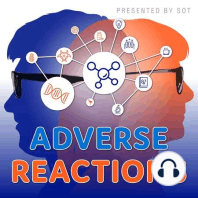30 min listen

Speak Softly and Carry a Big Dataset: The Exposome
Speak Softly and Carry a Big Dataset: The Exposome
ratings:
Length:
27 minutes
Released:
May 13, 2021
Format:
Podcast episode
Description
Ohio State University’s Darryl B. Hood reveals how a database with about 25,000 environmental factors and variables associated with the public health exposome may soon lead to major breakthroughs in addressing disparate public health outcomes in various communities. He also shares with co-hosts Anne Chappelle and David Faulkner his experiences from a lifetime of firsts—from being a plaintiff in Brown v. Board of Education to transitioning from an HBCU (historically black college and university) to a program where he was the only Black man. About the GuestDarryl B. Hood, PhD, is an Associate Professor and environmental neuroscientist in the Division of Environmental Health Sciences in the Ohio State University College of Public Health. Dr. Hood received a BS in biology and chemistry from Johnson C. Smith University in Charlotte, North Carolina, and a PhD in biochemistry from the Quillen-Dishner College of Medicine at East Tennessee State University. After completing a postdoctoral fellowship at the Center in Molecular Toxicology at Vanderbilt University School of Medicine in 1993, Dr. Hood accepted a position at Meharry Medical College and served meritoriously until 2013 on the faculty of both Meharry Medical College and Vanderbilt University School of Medicine in the Department of Pharmacology and Neuroscience. During this time, he received over $11.2 million dollars of research funding. From 2006 to 2011, Dr. Hood led what has come to be known as the most successful Minority S11 NIEHS-sponsored initiative, referred to as the Advanced Research Cooperation in Environmental Health (ARCH) Program. The research conducted under this consortium ultimately contributed to the scientific database that the US Environmental Protection Agency (US EPA) used to reassess the levels of polycyclic aromatic hydrocarbon emissions from smokestacks. Such reassessments have resulted in public policy changes that will serve to decrease the adverse health effects associated with environmental exposures. The Meharry Medical College-Vanderbilt University ARCH Consortium was recognized as being at the interface of successful P01-like research programs in general, and for systems toxicology research in particular. This construct served as the template that then–NIH Director Dr. Elias A. Zerhouni used as the viable, futuristic model for the development of effective scientist-to-scientist interactions between research-intensive universities and historically black colleges and universities.At the Ohio State University, Dr. Hood has continued his innovation in discovery as the co-architect of the novel Public Health Exposome framework. This paradigm-altering framework interrogates hypotheses focused on determining if there are associations between the built, natural, and social environments and disparate health outcomes observed in vulnerable populations. Collectively, Dr. Hood has 105 peer-reviewed publications, including book chapters, and has mentored over 15 MSPH/MPH candidates, 15 PhD candidates, and nine postdoctoral fellows. He continues to serve on numerous editorial and review boards for scientific journals, government agencies, and academia. Most recently, from 2010 to 2016, he served on the US EPA Exposure and Human Health Subcommittee of the Science Advisory Board.DisclaimerThe viewpoints and information presented in Adverse Reactions represent those of the participating individuals. Although the Society of Toxicology holds the copyright to the production, it does not vet or review the information presented, nor does presenting and distributing the Adverse Reactions podcast represent any proposal or endorsement of any position by the Society.
Released:
May 13, 2021
Format:
Podcast episode
Titles in the series (23)
DNA Isn't Destiny, So What Is? by Adverse Reactions